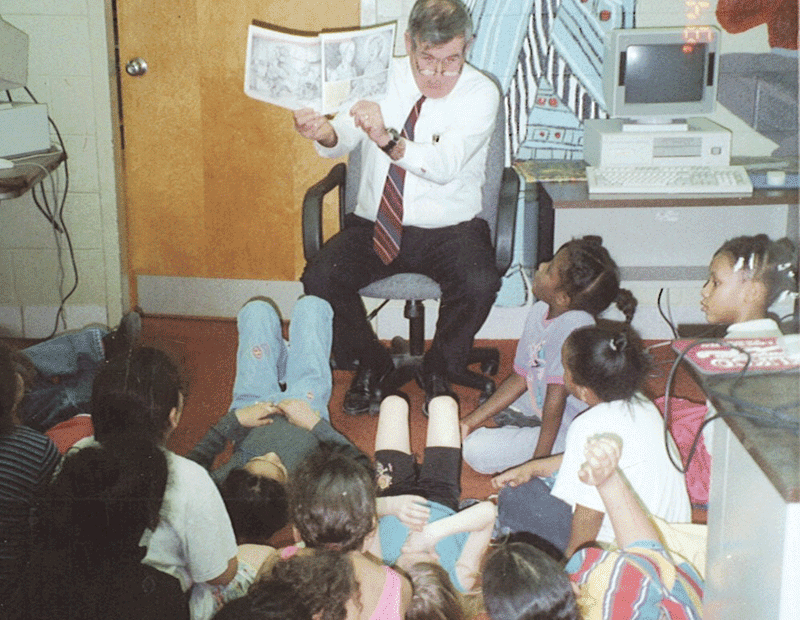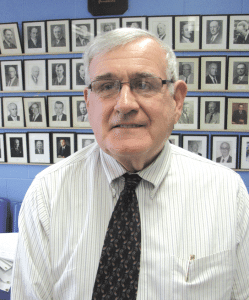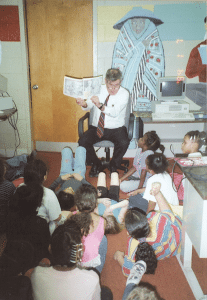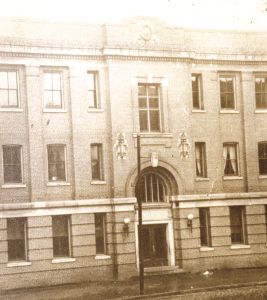
Lifetime Achievement
For a Half-century, Gary McCarthy Has Been True to the Boys & Girls Club Mission
 Gary McCarthy was asked how the City of Homes and the institution known now as the Boys & Girls Club of Greater Springfield have changed since he first started hanging out there almost 60 years ago.
Gary McCarthy was asked how the City of Homes and the institution known now as the Boys & Girls Club of Greater Springfield have changed since he first started hanging out there almost 60 years ago.
He leaned back in his chair, looked skyward, and gave a slight sigh as if to indicate that this exercise was going to test his memory. As things turned out, it didn’t. The memories, and the perspective, seemed to flow.
And he started with some history/geography lessons, specifically in the form of a fond look back at what was known as the Chestnut Street Club — the precursor to the facility on Carew Street where he’s served as executive director for the past 26 years and in some capacity for more than four decades — and the neighborhood around it.
“The front door would be in the middle of what is now Liberty Street Extension,” he said of the old club, which was one of dozens of buildings leveled in the mid- to late ’60s as part of a sweeping urban-renewal effort that forever changed the city’s North End. “There are a lot of people with some very special memories of that place; I’m one of them.
“That whole area was residential — there were a lot of apartment buildings,” he said of the blocks to the west of Chestnut Street, while flashing back five decades or more. “There were a lot of kids from that area that came to the club.”
As for the city itself, McCarthy, who grew up in Hungry Hill, said Springfield’s neighborhoods were much more “ethnically defined,” as he put it. “When I lived on the Hill, it was still the white, Irish, Catholic neighborhood; the North End had a large African-American population. A lot of the kids came to the club together because they lived on the same street.”

Gary McCarthy has been associated with the Springfield Boys & Girls Club in some capacity for close to 60 years.
But after all that talk about what has changed, McCarthy wanted to focus most of his time and energy on what hasn’t — the simple fact that young people in Springfield still need a place to go after school, on Saturdays, and in the summer — a place that’s safe, accessible, affordable, and can help shape their lives in the right ways.
Despite some considerable fiscal challenges, the Springfield club has always been all those things, he said, adding that, as he looks back on his career, this is the achievement to which he attaches the most satisfaction.
“We’re obviously very proud of how we protected that mission of being a drop-in center, an open door,” he explained. “If a kid needed his or her Boys & Girls Club, they came in, they gave us a little information, if they had a dollar, we’d take it, and if they didn’t, we didn’t care. They came in, and they really earned their membership by being a good citizen — a good Boys & Girls Club citizen, and trying to understand what this organization stood for.
“Kids need a safe place to have fun — it’s that simple,” he continued, knocking the organization’s reason for being down to just a handful of words. “Some nonprofits, and even ones like ours, are starting to think this is something you don’t want to say and shouldn’t be saying. But I happen to think that’s still a big part of why we’re here; young people still need a place where they can work with good, responsible, caring adults, and have a place where they can enjoy their lives.”
For this issue, BusinessWest took the opportunity to talk with McCarthy just weeks from his scheduled retirement. It was a learning experience served up by someone for whom the club has generated a lifetime of memories — quite literally.
Mission: Statement
There was a small fire at the Chestnut Street Club in the 1960s, started, according to local legend, when a popcorn maker was left on inadvertently.
McCarthy laughed off some jokes — at least he thinks they’re jokes — from current club staffers (probably preparing material for an elaborate retirement party on June 8) who believe he might have been the one responsible for the calamity. But he admits he was there, on concessions duty, that night.
Of course, he’s been there, handling some manner of duties, almost every day since he was 15 years old — with the notable exception of a six-year run as director of the Westfield club in the early and mid-’80s. He started as a CIT (counselor in training) at the club’s summer camp, but took on a number of jobs through high school and beyond, from handling concessions to working in the game room; from running the projector on ‘movie night’ to running the second-floor gym at the old club.
And as he moved from the old Technical High School, where he was in what amounted to a college-prep program, to American International College, where he majored in sociology, he essentially made the decision that the Boys Club (‘& Girls’ was added officially in the mid-’80s) was going to be more than a place where he earned a paycheck; it was going to be a career.
When asked how and why he came to that conclusion and became what’s known within the organization as a ‘Boys Club guy,’ he said that, through all those years of being a member and then serving members in all those capacities, he had simply become enamored not only with the mission, but the prospect of leading a team that carried it out.
“The club was a very important part of my life; while I had some nice teachers in the public school system and had some fine role models, the club was the place that really shaped my life,” he said, noting that the phrase has many meanings; he met his wife, Eileen, there while she was teaching economics. “And we think we still do that today; people just reached out, they accepted you, they nurtured you, they were friendly to you, although they made you toe the mark — if you screwed up, you paid.
“The club was instrumental in helping me gain discipline and character,” he continued. “I have a family, and I’d like to think that I’m a good husband and a real good dad, and the club had a lot to do with that. You lived it every day; they made you live it every day. And when the job experiences came along, and that demand was there to set the standard for the younger people, that was very rewarding.”
Fast-forwarding through all the lines on McCarthy’s résumé — it’s fairly easy, because he’s never drawn a paycheck from an organization other than the Boys & Girls Club — one sees that he moved up the ranks fairly quickly, eventually serving as program director at the club and its summer camp and then as assistant director under longtime director Mike Pagos.
Having gone as far as he could, other than the corner office, in Springfield, and with Pagos still years from retirement, McCarthy made what he considered a necessary career move by taking the helm of the much smaller Westfield club. There, he gained important administrative experience (while also calling more bingo), and made himself the logical successor to Pagos when he stepped down in 1988.
“In those days, it was very hard for a person to move on to the next step at a club this size without having received some administrative experience elsewhere,” he noted. “I was fortunate to have that great learning experience in Westfield.”
And once he returned to Springfield, he knew he’d be in that position for as long as the board wanted him there. “I never seriously thought about leaving; this was the club that developed me, and it’s always had a great reputation for serving people. I never wanted to be anywhere else.”
Time Passages
The door to the closet in McCarthy’s office was ajar — just enough to bring the Santa suit hanging there into view.
He’s played that part for many years during the Festival of Trees, and it has become just one of many lines, official and unofficial, on his job description. Others have included everything from bingo caller — he did a lot of that when the game was the club’s principal fund-raiser — to acting as a spotter for one of the closest-to-the-pin competitions at the annual golf tournament, which he was preparing for as he talked with BusinessWest, with tee-sponsorship signs scattered about his office.
But mostly, his job has been to set a tone for this organization, and in many respects it hasn’t been difficult, because it was the same one he encountered when he first walked into the Chestnut Street Club in the early ’50s.
It’s all about meeting that mission of what amounts to being a safe haven for young people, he said, a place where they can learn, forge friendships, and build character.

The old Chestnut Street Club, where Gary McCarthy was first introduced to the Boys Club mission as a member.
The Springfield club still charges only $10 a year for membership ($25 for year-round activities) in an effort to remain accessible for families, many of whom live at or below the poverty line, he said, adding that the process of closing the gap between the cost of programs and operations and what memberships generate in revenue has become more difficult.
“You could run a club for a lot less years ago — just look at health insurance,” he said with laugh, citing just one example. “In those days, a lot of your people were young and single, and medical insurance would cost you $300 per person; now, it’s $16,000 for someone with a family.
“Those types of expenses — utilities, insurance, all those things — escalated dramatically,” he went on. “And that’s why we’re proud that we’ve been able to maintain the foundations of our club and be that safe place to go.”
As he mentioned, fund-raising has changed dramatically from the days when a large disbursement from the United Way, supplemented by bingo revenues, pretty much covered expenses. Today, the club relies much more on fund-raisers such as the golf tournament and the Festival of Trees, as well as its endowment and direct solicitations.
But while many fiscal issues have changed over the years, young people, by and large, have not, said McCarthy, noting that, while technology provides more distractions, and there are more things to do than when he was an adolescent, the same basic needs exist, and it is more important than ever to meet them.
“When you’re talking about gangs and other issues like that, any time you can give kids an alternative that’s easy to get to and that can get them engaged quickly, that’s critical,” he said. “And it’s as important, if not more important, than when I was a kid.”
When asked what he’ll miss most when he turns off his office light for the last time, he said it will be the kids — generations of them who were instructed to use ‘Gary’ and never ‘Mr. McCarthy’ when addressing him.
“One of the most fun parts of my job, even though I’m tucked back here most of the day, is when I get antsy and take a walk along the halls while the kids are here,” he explained. “Hearing them say ‘hey, Gary’ or ‘hi, Gary’ and moving on their way … I’m going to miss that a lot.”
Life’s Work
When asked if, and in what ways, he would be involved with the Boys & Girls Club after August, McCarthy, who probably can’t remember a day when he wasn’t associated with this organization in some way, paused for a moment before using humor to say that he really will be moving on.
“When you’ve hung around this long, you start wondering, with all these new fads and ways of doing things, if you’re getting to be a dinosaur,” he said. “And besides, I didn’t have some senior old timer looking over my shoulder, and whoever comes next doesn’t need me doing that, either.”
Maybe not, but whoever the next leader of this organization is, he or she could do a lot worse than getting counsel from someone who has made the club his life’s work — in every way that phrase can be used.
George O’Brien can be reached at [email protected]




